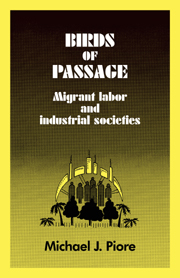Book contents
- Frontmatter
- Contents
- Preface
- 1 Introduction
- 2 The jobs
- 3 The migrants
- 4 Particular characteristics of the migrant labor market
- 5 The impact of migration on the place of origin
- 6 The historical evolution of long-distance migration in the United States
- 7 The dilemmas of current U.S. immigration policy
- Notes
- Bibliography
- Index
- Frontmatter
- Contents
- Preface
- 1 Introduction
- 2 The jobs
- 3 The migrants
- 4 Particular characteristics of the migrant labor market
- 5 The impact of migration on the place of origin
- 6 The historical evolution of long-distance migration in the United States
- 7 The dilemmas of current U.S. immigration policy
- Notes
- Bibliography
- Index
Summary
The kind of migration with which this book is concerned has played a central role in American economic development, and, hence, perforce, in the evolution of American society. Many of us are the children and grandchildren of such migrants; those who are not have parents and grandparents whose lives were vitally affected and fundamentally changed by the immigrants' arrival. Most of us, therefore, have reason to think we understand something about migration. That understanding affects in a number of ways our conception of who we are as individuals and how we came to be that way. It is also central to our conception of what we in the United States are as a nation and how our nation is distinguished from the other countries of the world from which our parents came.
Our image of migration tends to be very particular. In that image the migrant at his home makes a deliberate decision to move to some other place. The move is viewed as permanent. The migrant may indeed go back. But in the conventional view, to go back is to change one's mind. Often, in the conventional view, those who go back are spoken of as failures.
This view, as an image of contemporary migrations between industrial societies and less-developed areas, is wrong. Most such migrations in the beginning are temporary. The typical migrant plans to spend only a short time in the industrial area; he then expects to return home. Staying represents a change of plans.
- Type
- Chapter
- Information
- Birds of PassageMigrant Labor and Industrial Societies, pp. 50 - 85Publisher: Cambridge University PressPrint publication year: 1979
- 1
- Cited by



